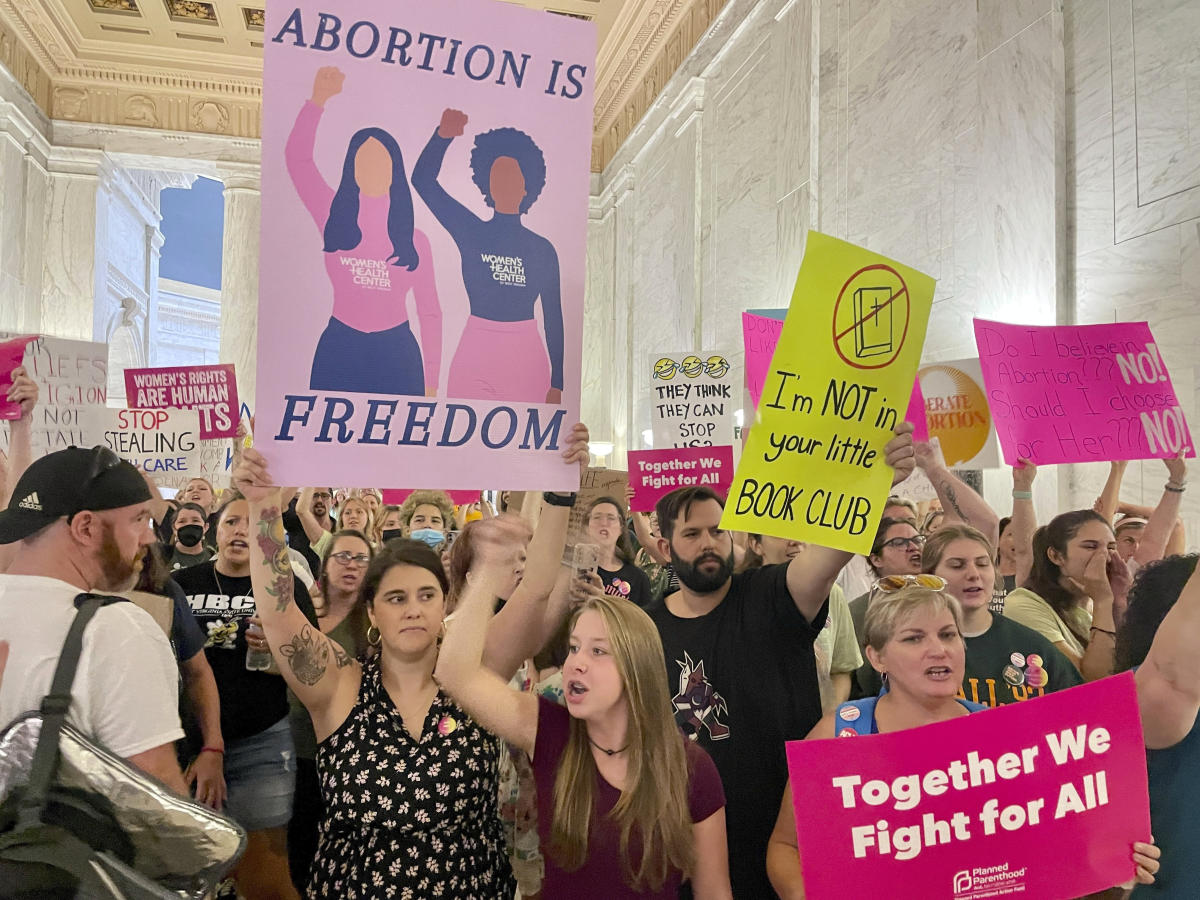
CHARLESTON, W.Va. (AP) — A bill banning abortions except in case of rape or incest is up for a final vote Friday in West Virginia’s Senate, which could make the state the first to pass new legislation restricting access to abortions since the U.S. Supreme Court’s ruling last month removing its protected status as a constitutional right.
Several Republican-led states had “trigger” abortion bans in place in advance of the court ruling, but West Virginia lawmakers are taking action because of legal uncertainty over whether a ban from the 1800s that was upended by the 1973 Roe v. Wade decision could be enforced now.
As in other states dominated by socially conservative lawmakers, there’s not much question about whether abortion will be banned generally now that states have the power to do so — but whether the ban will apply to pregnancies caused by rape or incest.
In South Carolina, a ban without the exceptions has been introduced. In Arkansas, outgoing GOP Gov. Asa Hutchinson would prefer to add them to the ban that’s already in effect, but he has balked at asking lawmakers to address the issue in a special session.
The high-profile example of a 10-year-old rape victim in Ohio, a state without an exception for rape in its abortion restrictions, who traveled to Indiana for an abortion has amplified the debate.
Tension over the question gripped the Indiana Senate in a session that began Thursday and finally wrapped up after midnight. A final vote there is expected Saturday on the bill, which includes exceptions for rape and incest.
The West Virginia bill, which some lawmakers have complained was not vetted by any Senate committees, would mandate prison time for medical providers who perform abortions. The measure, which already passed in the House of Delegates, allows exemptions for victims of rape and incest up to 14 weeks of pregnancy. The exemption requires victims to report their assault to law enforcement.
The bill also provides other exceptions for an ectopic pregnancy, a “nonmedically viable fetus” or a medical emergency that could kill or cause a substantial and irreversible injury.
The state’s only abortion clinic initially stopped offering abortions after the latest ruling, but resumed this month as it mounted a court challenge on whether the old ban applied. On July 18, a Charleston judge barred the state from enforcing the ban, ruling it had been superseded by a slew of conflicting modern laws such as a ban on abortion after 20 weeks.
Republican Gov. Jim Justice called the special legislative session to consider an abortion ban and said during a media briefing earlier this week that the abortion bill “is so important, it’s off the chart. We need modernization to our law, and what we have on the books is ancient.” He didn’t indicate whether he would sign the bill that passed the House, and the governor’s office didn’t immediately return an email Thursday requesting comment on that version.
The vote in the GOP-dominated House on Wednesday came amid a protest from dozens inside the Capitol and followed a raucous public hearing in which most speakers — given just 45 seconds each to voice their opinions or be cut off — opposed the bill.
Most of the 90 speakers who stepped to the microphone opposed the bill. They included 12-year-old Addison Gardner, a student at Buffalo Middle School, who posed a vivid hypothetical situation for lawmakers.
“If a man decides that I’m an object and does unspeakable and tragic things to me, am I, a child, supposed to carry and birth another child?” she said. “Am I to put my body through the physical trauma of pregnancy? Am I to suffer the mental implications? A child who had no say in what was being done with my body. Some in here say they are pro-life. What about my life? Does my life not matter to you?”
Another speaker, Lorrie Lugursky of West Virginians for Life, said she got pregnant at 15 and was told an abortion was her best option but didn’t go through with it. “God saved my baby girl,” she said.
On Friday, people seated in the packed galleries above the Senate chamber shouted “shame on you” when the afternoon session went into recess almost as soon as it started.
When the debate finally began hours later, Democrats complained that they did not have a final version of the Senate’s bill prior to the start of Friday’s session that included a dozen amendments.
“This has been a slow-motion train wreck,” Senate Democratic leader Stephen Baldwin of Greenbrier County. “This bill would put doctors in jail for doing their job and for following their oath.”
In Indiana on Thursday, there was a nearly four-hour delay in a Senate session as lawmakers met privately to discuss the exceptions, which were ultimately left in over strong objections from some conservative lawmakers.
“Exceptions equal death for unborn innocent children,” said Sen. Mike Young, the Republican who filed an amendment that would only allow abortions to protect the life of the mother.
Eighteen Republicans ultimately joined 10 Democrats in voting to keep the rape and incest exceptions in the proposal. But the votes of many of the Republicans who voted for eliminating the exceptions will be needed for the bill to advance to the House. If not enough switch, it could keep abortion would remain legal in the state for now.
A final vote there is expected Saturday.
While legislative battles over abortion have begun, much of the fallout from the Supreme Court’s decision has played out in the court system. In Louisiana, enforcement began of a near-total ban but was halted by a judge earlier this month. On Friday, a judge ruled enforcement could resume — though it was not immediately clear when.
___
For AP’s full coverage of the Supreme Court ruling on abortion, go to https://apnews.com/hub/abortion.
___
Associated Press writers Sara Cline in Baton Rouge, Louisiana; Geoff Mulvihill in Cherry Hill, New Jersey, and Arleigh Rodgers in Indianapolis contributed to this report. Rodgers is a corps members for the Associated Press/Report for America Statehouse News Initiative. Report for America is a nonprofit national service program that places journalists in local newsrooms to report on undercovered issues.




